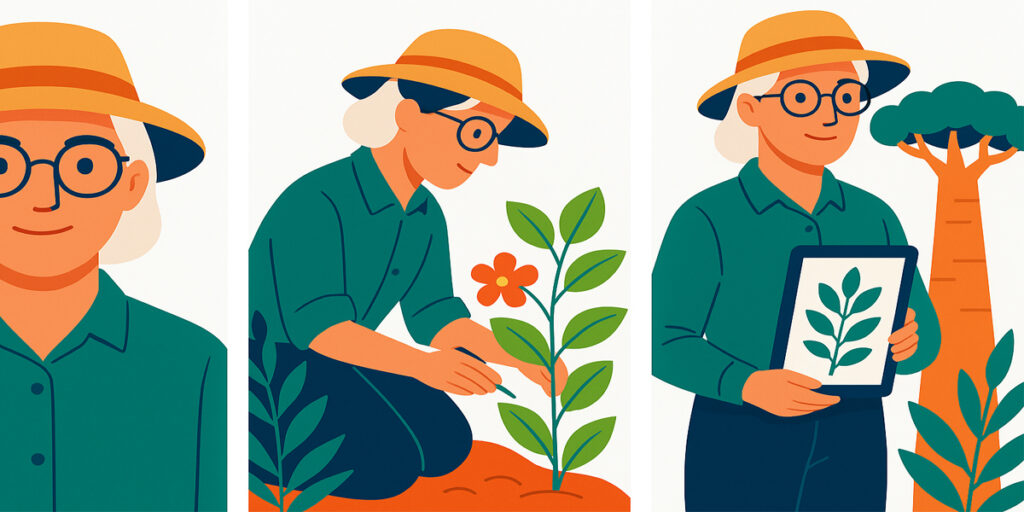Across the lush and trembling veins of the Earth—through misty jungles and mountain soils—there live quiet souls who don’t simply study nature, but feel it with their eyes, their hands, and the deep chambers of the heart. Among them moved Lucile Allorge, a woman whose gentle devotion sank roots into the red soil of Madagascar, blooming into a life shaped by care, wonder, and the urgent call to protect the planet’s most fragile and forgotten plants.
Born in France, Lucile’s early years unfolded not in leafy jungles but in the pages of books and in the natural curiosity of childhood. But curiosity is a powerful compass. It led her, step by step, into the heart of tropical biodiversity. Her journey was not loud or filled with headlines—it was steady, thoughtful, and filled with reverence. She chose plants not simply as specimens but as storytellers, each holding a history, a culture, a medicine, a mystery.
Lucile walked into the vast world of ethnobotany with the soul of a listener. Her studies didn’t just document plants; they preserved the whispers of generations. In the villages and remote forests of Madagascar, where ancient knowledge flickered like candlelight, she listened to elders and healers who knew which root could soothe fever, which leaf could draw out pain, which bark held the scent of memory. To Lucile, science and tradition were not rivals—they were allies.
Madagascar became her second home. Not as a visitor, but as a steward. Her hands touched leaves found nowhere else on Earth. Her footsteps threaded the same paths as lemurs and lizards and silent seeds waiting for rain. She became a guardian of rare species, a voice for green life that had no voice of its own.
With every step through Madagascar’s forests, Lucile uncovered beauty and urgency. She saw how forests bled when logged, how species vanished like mist, and how quickly silence followed destruction. But she didn’t allow despair to root itself in her heart. Instead, she sowed action. She worked to create conservation programs that were not just scientific, but human—projects that honored the knowledge of local communities and gave them the tools to protect the green heritage that fed their lives.
Lucile did not chase fame, but the world listened all the same. Her work became a bridge between continents—connecting French research institutes with the needs of local farmers, weaving together biodiversity and cultural survival. She believed that the future of a rare orchid in Madagascar was not separate from the child playing under its shade. And so, she fought not only for plants but for balance—between nature and people, progress and respect, research and humility.
Tropical conservation became her lifelong rhythm. Her efforts expanded beyond Madagascar to many corners of the globe. Wherever ecosystems were endangered, Lucile lent her strength. She joined hands with botanists, conservationists, and indigenous communities. Her fieldwork carried seeds of change to herbaria, conservation centers, and even classrooms. She taught with the patience of the forest—firm, quiet, and lasting.
What made Lucile special wasn’t only her knowledge—it was her way of seeing. She didn’t just classify plants; she honored their place in the great web of life. To her, a plant was never “just a plant.” It was an ancestor, a healer, a home, a hope. She reminded the world that saving a species is not about numbers—it’s about love, connection, and shared destiny.
Even as years passed and the world spun faster, Lucile stayed rooted in her purpose. Her energy moved from field to desk, from microscope to map, from conversation to policy. She wrote, she spoke, she advised. But always, her compass pointed to the forest. She wore the dust of jungle trails like a badge and carried the stories of plants like sacred texts.
Lucile’s legacy is not carved in stone. It grows still—in the rebirth of a protected grove, in the quiet smile of a child learning about native flora, in the pages of botanical guides that carry her touch. Her legacy is alive wherever a rare seed is planted and allowed to bloom in peace.
And in the deep green heart of Madagascar, where the trees whisper her name through leaves and light, her presence lingers—not as a shadow, but as a living spirit. She taught the world to care more deeply, to look more closely, to honor the green breath of Earth as part of our own.
Lucile Allorge did not need applause. The wind in the canopy, the flowering of a rare baobab, and the return of birdsong to a once-silent forest—these were her applause. These were her victory.




















